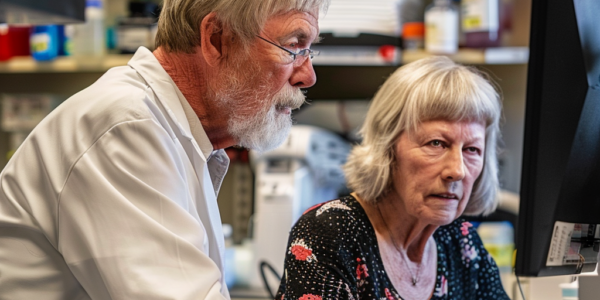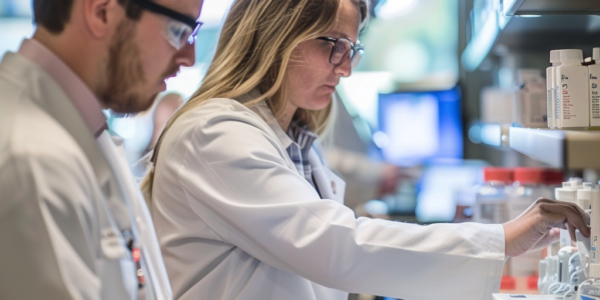Transforming Cancer Treatment: The Rise of Precision Medicine and Innovative Startups
The integration of precision medicine is revolutionizing cancer treatment, particularly in developed countries like the US and UK. Startups such as Creasallis and Concr are leading the way in developing targeted therapies and innovative analytical tools, significantly improving patient outcomes and addressing ongoing challenges in oncology. Discover how these pioneers are shaping the future of cancer care.
Dana-Farber Cancer Institute Partners with OncoHost for Groundbreaking Kidney Cancer Study
Dana-Farber Cancer Institute partners with OncoHost to study biomarkers for renal cell carcinoma, aiming to enhance clinical decision-making and patient management. The study will analyze blood samples to create personalized treatment plans and predict patient responses to immune-checkpoint inhibitor therapy, revolutionizing kidney cancer treatment.
Groundbreaking 3D Printed Pills with Timed Drug Release Developed by University of Nottingham Researchers
Researchers from the University of Nottingham have developed 3D printed pills using Multi-Material InkJet 3D Printing, allowing for personalized medication with timed drug release capabilities. This innovative method controls drug release rate within the tablet, simplifying complex medication regimens into a single dose. The technology has the potential to revolutionize drug delivery and advance personalized medicine, although challenges like the need for additional formulations remain. With the ability to print 56 pills in a single batch, this advancement showcases the potential for mass production of personalized medicines for diseases requiring precise timing and dosage accuracy.
Clemson University Researchers Shed Light on Personalized Medicine
Clemson University researchers Trudy Mackay and Robert Anholt have published a review paper on pleiotropy and epistasis, shedding light on the complex aspects of human genetic traits. Their aim is to provide a comprehensive framework for the development of precision medicine, highlighting the prevalence of pleiotropy in model organisms and the often overlooked non-additive gene-gene interactions of epistasis. By addressing the limitations of previous medical studies, the researchers hope to pave the way for new approaches in personalized medicine.
AI-Based Tool HLA Inception Has Potential to Revolutionize Personalized Cancer Treatments
Arizona State University scientists have developed an AI-based learning tool called HLA Inception, which has the potential to revolutionize personalized cancer treatments. The tool can predict how an individual’s immune system responds to foreign cells, expediting the process of making predictions on pathological outcomes of patients and potentially transforming patient care.
The Role of Pharmacists in Integrating Pharmacogenomics Testing for Improved Medication Outcomes
Pharmacogenomics is increasingly important in clinical practice, and pharmacists are uniquely positioned to lead the way in integrating pharmacogenomics testing. The Clinical Pharmacogenetics Implementation Consortium (CPIC) has been providing guidelines for clinical care, including recommendations for cardiovascular medications such as clopidogrel. Pharmacists’ involvement in integrating pharmacogenomics testing into cardiology clinical practice holds significant potential to optimize medication therapy and improve patient outcomes.
Genomic Data in the All of Us Research Program
The All of Us Research Program is making significant strides in mapping the genetic basis of human disease, with a focus on diversity and inclusion. The latest release includes 245,388 clinical-grade genome sequences, with a high percentage of participants from historically under-represented communities and racial and ethnic minorities. The comprehensive dataset has identified over 1 billion genetic variants, with coding consequences for over 3.9 million, and is publicly available for researchers to access. This diverse dataset is expected to advance the promise of genomic medicine for all.
AI-VISION Study Launched to Improve Precision Therapy in Breast Cancer
Researchers from ICR, the Royal Marsden, and experts from the University of Durham and Concr are launching an AI-based clinical study to improve precision therapy in breast cancer. The AI-VISION study will profile tissue samples from patients with triple-negative breast cancer to define and validate biomarkers of chemotherapy response. This two-year study, funded by Innovate UK, aims to deliver precision medicine and improve clinical decision-making for cancer patients.
Genomic Medicine Revolutionizing Cancer Care with Whole-Genome Sequencing
Genomic medicine is leading a revolution in cancer care, with whole-genome sequencing at its core. This tool can sequence a person’s DNA in its entirety, providing a comprehensive test for potential genetic factors contributing to cancer development. Cancer has become…
Study Raises Concerns About Generalizability of Clinical Prediction Models in AI Healthcare
A recent study published in the journal Science has raised concerns about the generalizability of clinical prediction models, particularly in the context of artificial intelligence (AI) in healthcare. The study, conducted by Adam M. Chekroud, Matt Hawrilenko, Hieronimus Loho, Julia…










